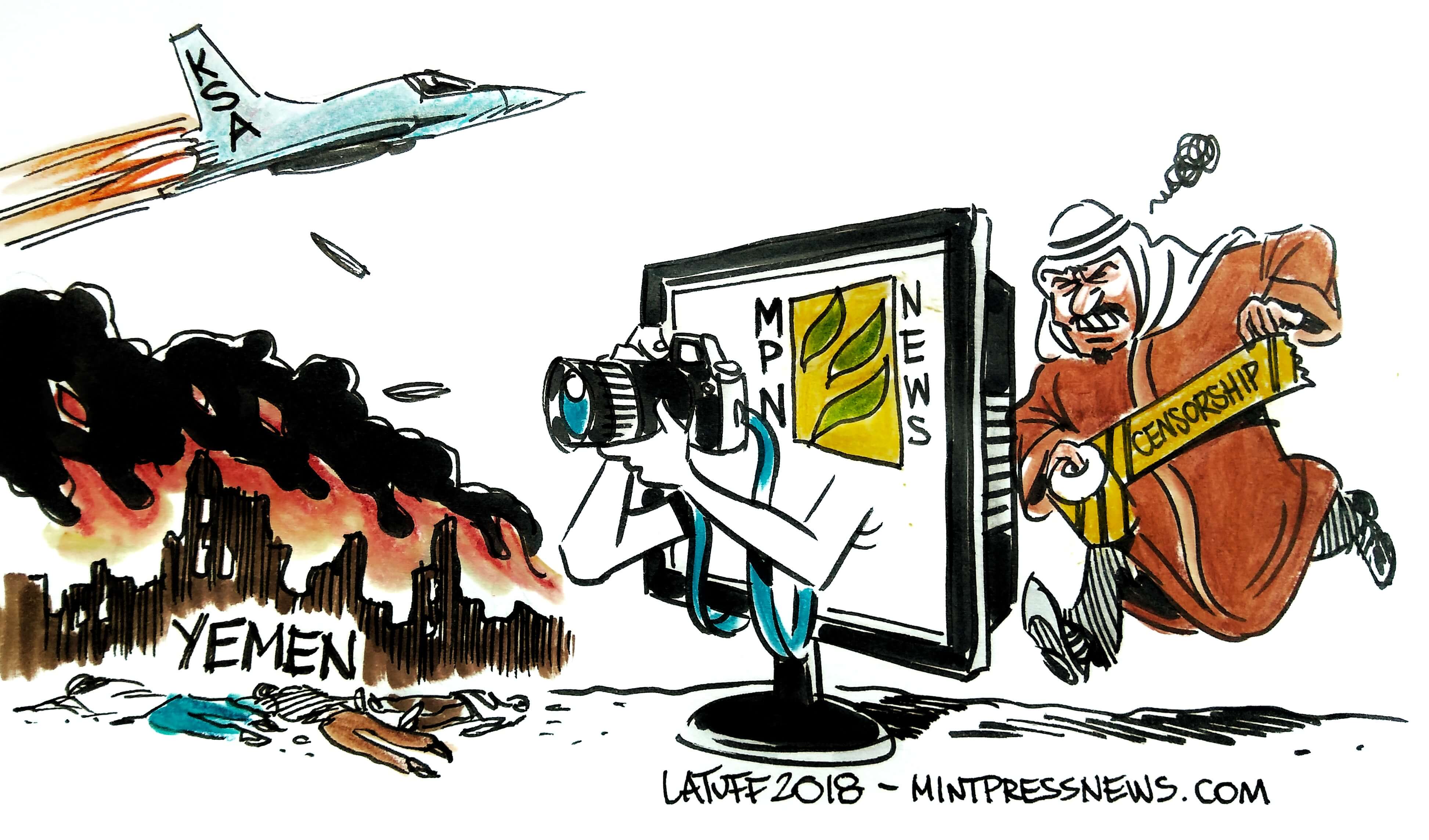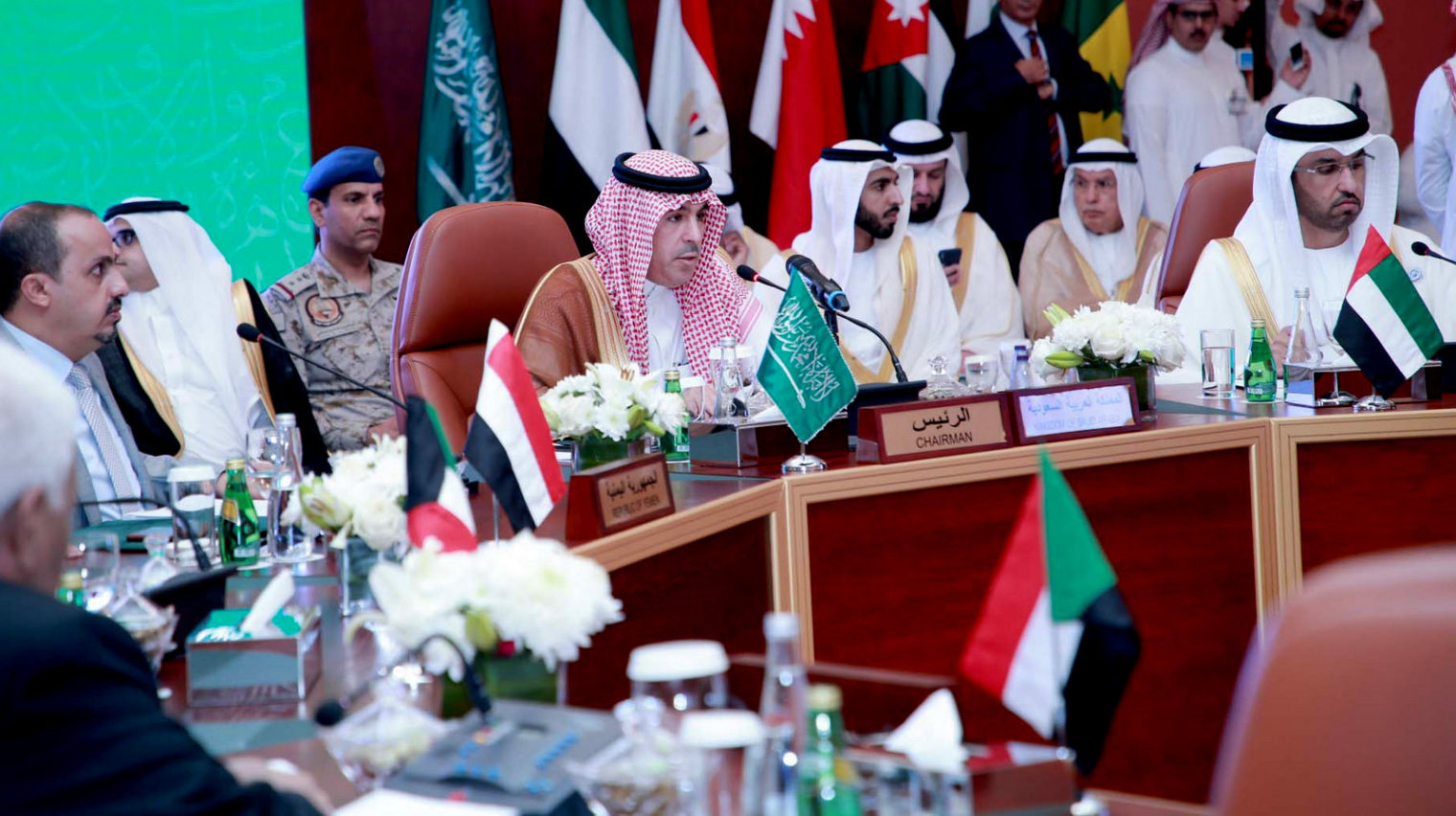Saudi-Led Coalition Ministers of Information Meeting Probes Ways to Block Critical Coverage of Yemen War
YemenExtra
Ahmed AbdulKareem
“That was the last time I saw Hashem,” recounted Mohammed Al Humran, a local Yemeni journalist, as he said how his 21-year-old son Hashem was killed in a double-tap airstrike while filming Saudi bombing raids in Dahian, north of Sadaa.
Hashem was one of the 180 journalists who have been killed in Yemen by Saudi-coalition forces, according to a report by the Union of Yemeni Journalists.
Since the U.S.-backed Saudi-led coalition’s war on Yemen began on March 26, 2015, journalists have been a preferred target, a fact that Saudi Arabia doesn’t shy away from acknowledging. Former coalition spokesman Brigadier General Ahmed Asiri said in a March 2015 press conference that opposition media outlets would be targeted by the coalition and just three weeks ago, at a press conference in Riyadh, the Saudi-led coalition’s spokesman reiterated Saudi Arabia’s willingness to target journalists. MintPress News journalist Ahmed AbdulKareem was injured by a Saudi airstrike in 2015 while covering clashes near the Yemen-Saudi Arabia border.
Although the coalition’s war in Yemen barely registers in the international mainstream news, the Saudi coalition and its allies have been desperate to curb negative coverage of the war, which the U.N. has called the world’s worst humanitarian disaster.
Aside from a coalition-imposed moratorium on foreign journalists entering Yemen, a recent report by the Yemeni Media Union highlights a great deal of coalition activity aimed at controlling the narrative surrounding the unpopular war, including: “five cases of cloning ‘tv’ channels, 22 cases of destruction of ‘media’ facilities, 30 cases of targeting radio and television broadcasting centers, seven cases of suspension from broadcasting on Arabsat and Nilesat, and seven cases of blocking and disturbing channels.”
Despite the coalition’s efforts, ongoing work by local journalists and attention from international human-rights organizations continues to draw the ire of coalition leadership, who recently held a meeting of the coalition’s Ministers of Information in Jeddah, Saudi Arabia to discuss strategies to curb what they see as a threat posed by local and international media.
Ministers of Information meeting in Jeddah
According to a source present in the meeting, officials named MintPress News, along with other media, as a threat to their ongoing military operation in the port of Hodeida and developed a number of strategies to stem the flow of information from the frontlines of war. The source, who wished to remain anonymous for fear of retaliation, went on to say:

They plan to target all media present on Yemen’s coast, especially in Hodeida, including local radio and broadcasting stations and transmission networks … they also plan to use radio transmissions broadcast from Saudi coalition battleships off of Yemen’s coast to broadcast propaganda and psychological warfare to residents and fighters.”
One of the strategies discussed in the meeting was using intimidation tactics to “force residents of Hodeida and surrounding regions to flee until the area effectively turns into a military zone,” a source told MintPress. According to Abdul-Wahab al-Sharif, director of Yemen’s National Commission for Humanitarian Affairs, over 13,000 families have already been displaced since June 14 when the coalition began its putsch to seize control of Hodeida.
Moreover, the Saudi-led coalition plans to wield its considerable influence in the Middle East to push for further blocks of critical coverage of the war on NileSat and ArabSat, two of the largest satellite television providers in the region. The coalition has already been able to pressure regional providers to impose limited bans on the Lebanon-based Al-Manar and Al Mayadeen television channels over their coverage of the war and, according to the Union of Yemeni Journalists, have been able to shut down all local television broadcasts from inside of Yemen a total of seven times since the war began in 2015.
Taking the fight online
The coalition also intends to take its media blitz to the internet. During the meeting in Jeddah, plans were discussed to push for the blocking or removal of social-media pages and online activity of journalists covering the war. The social-media profiles of hundreds of Yemeni activists have already been blocked since the war began. Saudi Arabia and the UAE have a well-established history of shuttering access to social media platforms and banning the coverage of certain topics within in their own borders; and, according to Freedom House, “Saudi Arabia has one of the most censored media environments in the world.”
A source who attended the meeting in Jeddah told MintPress that “Saudi Arabia and the UAE also discussed plans to publish fabricated news stories claiming Houthi fighters mined the port and intentionally deployed their fighters to residential areas,” in a bid to justify the heavy civilian losses that have come as a result of their operation. Plans to increase pro-Saudi and UAE narratives using paid commenters and social-media users were also discussed. Both countries have used paid online trolls to target known Yemeni activists and journalists in the past.
Blacklisting critical coverage
Journalists providing coverage of the war have also been subject to harassment by Saudi Arabia and the UAE, often being blacklisted or threatened if they refuse to curb their reporting. A Yemeni journalist embedded with Houthi forces told MintPress on condition of anonymity that he received a strange phone call from someone claiming to be from the ‘Coalition Operations Room:’
I got a call days ago from an unidentified person who said he was from the Coalition Operations Room. He told me I should leave the Houthis and join the coalition; he promised me legitimacy and financial advantages and told me I would be targeted if I didn’t comply.”
Well-known Yemeni activist and journalist Rand Al-Adimi told MintPress that dozens of journalists and outlets have been blacklisted, adding that “the Saudi-led coalition blacklisted my name, adding it to a list of journalists who threaten their genocide.” Al Adimi runs a website covering the coalition’s war on Yemen with a special focus on her home province of Taiz.
A source who was attending the meeting in Jeddah confirmed that the harassment campaign was one of the strategies discussed in the meeting.
Local journalist and fixer Hussein al Bukhaiti isn’t deterred by news of the coalition’s efforts to step up attacks on the media. In fact, he recently traveled deeper behind the frontlines of the battle for Hodeida, hoping to capture images and videos that provide evidence to counter Saudi-coalition claims. He told MintPress,
The coalition Ministers of Information meeting will not affect Yemeni journalists and activists; what those ministers couldn’t do in past three years they can not do in the coming days. The meeting have actually made us more determined to fight back by all means and tools available.”
Top Photo | Information Ministers from the Saudi-led coalition speak during a meeting probing ways to curb critical coverage of their war on Yemen in Jeddah, Saudi Arabia. June 24, 2018. Ghazi Mahdi | AN
The original source of this article is MintPress.

